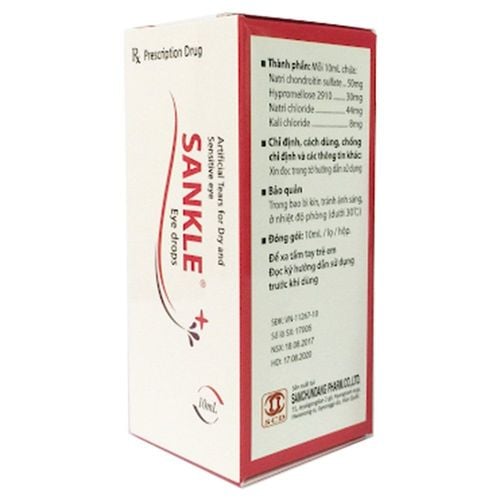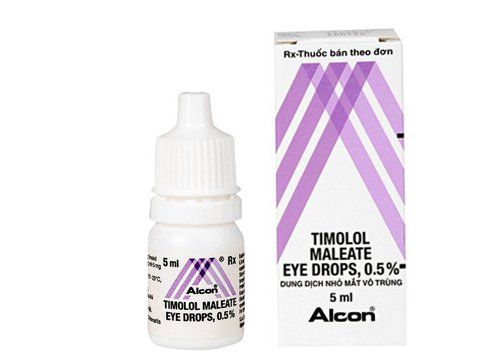This is an automatically translated article.
Brimonidine, also known as Brimonidine Tartrate, belongs to a group of drugs used to treat diseases related to eyes, ears, nose and throat. Patients can follow the article below to know what Brimonidine is?
1. What does Brimonidine do?
Brimonidine works by reducing fluid production and reducing pressure inside the eye. Indicated for use to lower intraocular pressure in patients with open-angle glaucoma.
Brimonidine can be used in combination with other antihypertensive agents to reduce intraocular pressure when patients do not respond to treatment regimens with other drugs.
The therapeutic effect of Brimonidine depends on the dosage form of the drug. Specifically:
Brimonidine tartrate gel is used in the treatment of rosacea with facial flushing in adults. Brimonidine tartrate 0.025 % eye drops are used to treat conjunctival obstruction. The drug Brimonidine has the following dosage forms:
Eye drops solution: Includes a vial with a capacity of 5 ml of brimonidine tartrate 0.2 % or a vial of 7.5 ml of brimonidine tartrate 0.025 %. Suspension of eye drops with 5ml vial of brimonidine tartrate 0.2 %. Gel for external use 3 mg/g. Contraindications of the drug Brimonidine in the following cases:
Hypersensitivity to the active ingredient Brimonidine tartrate or to any ingredient in the drug. Patients receiving treatment with a mono-amine oxidase inhibitor (MAOI) or using an antidepressant that affects noradrenergic transmission, such as tricyclic antidepressants and mianserin. Brimonidine tartrate as eye drops should not be given to children under 12 years of age and is contraindicated for infants and children under 2 years of age.
2. Dosage and usage
2.1. How to use With liquid medicine, used for eye drops, before use, the patient needs to wash his hands. First tilt your head back, use your hands to gently pull down the lower eyelid. Apply Brimonidine gently and then close your eyes, let it sit for 1-2 minutes for the medicine to be absorbed. Spills can be absorbed around the eyes with a clean towel and be careful not to let the cloth touch the eyes. Then wash your hands.
Note:
Patients need to keep the vial tightly closed so that bacteria do not affect the quality of the product. When instilling medication, do not let the tip of the dropper bottle touch your eyes. In case the patient uses many different types of eye drops, the time interval should be separated, not used at the same time to avoid unwanted side effects. If Brimonidine eye drops change color or the solution becomes cloudy, discontinue use. 2.2. Dosage Dosage for adults:
In the treatment of intraocular pressure: The recommended dose is 1 drop of Brimonidine Tartrate in the eye 3 times a day, approximately 8 hours apart. In the treatment of conjunctival obstruction: Use 0.025% brimonidine tartrate ophthalmic solution, instill 1 drop in the affected eye every 6-8 hours daily, up to 4 times/day. In the symptomatic treatment of rosacea of rosacea: Use topical gel, use each time when the patient appears symptoms. The maximum recommended daily dose is 1 g gel, applied once a day. In the beginning of treatment, only a small amount of gel should be treated for at least 1 week. The amount of gel can then be gradually increased depending on the patient's tolerability and response. Children: The safety and effectiveness of Brimonidine tartrate in children have not been established. For children 2 years of age and older, especially children 2 to 7 years old and weighing less than 20kg who need to be treated with drugs, extreme caution and close monitoring due to side effects such as somnolence are required. ...can occur with high incidence and severity.
3. Side effects of drugs
When using Brimonidine in the form of eye drops, patients may experience some common side effects such as: allergic conjunctivitis, conjunctival congestion and itchy eyes. Or other less common reactions such as: Burning sensation, conjunctival cystitis, increased blood pressure, allergic reactions in the eyes, dry mouth and visual disturbances.
For patients using Brimonidine 0.1-0.2% eye drops, rare side effects may occur such as: gastrointestinal disturbances, taste disturbances, allergic reactions, asthenia, bleeding. conjunctivitis, eyelid conjunctivitis, blurred vision, bronchitis, conjunctivitis, conjunctivitis, cataracts, cough, dizziness, shortness of breath, lacrimation, dry eyes, itchy eyes, eye pain, eyelid edema, eyelid redness, fatigue, flu syndrome, cystic conjunctivitis, foreign body sensation, headache, hypercholesterolemia, hypotension, infection, insomnia, keratitis, decreased visual acuity pressure, eyelid disorders, pharyngitis, photophobia, corneal ulcers, lacrimation, cataracts, vitreous detachment and vitreous disorders.
In addition, patients may also experience more serious reactions when taking Brimonidine such as:
Slow or irregular heartbeat; shallow breathing, feeling like fainting; heart palpitations or palpitations; Eye pain or increased tearing; Tingling in the hands or feet. If you experience these symptoms, the patient should stop using Brimonidine and notify the doctor for appropriate treatment.
4. Caution
Brimonidine can affect your blood pressure. Therefore, caution should be exercised when using the drug in patients with a history of cardiovascular disease or with existing cardiovascular problems. There are not enough data to prove that Brimonidine Tartrate is absolutely safe when used in people with liver and kidney failure. Therefore, caution should be exercised when used in these subjects. Brimonidine should be used with caution in people with depression, cerebral insufficiency, coronary insufficiency, Raynaud's phenomenon, orthostatic hypotension and vascular occlusion For children: The level of safety has not been determined. As well as the safety and effectiveness of the drug, some reactions have been reported such as: apnea, bradycardia, convulsions, cyanosis, depression, dyspnea, emotional abnormalities, increased blood pressure, hypothermia, hypotonia in pediatric patients receiving brimonidine tartrate 0.2%. Therefore, it is necessary to consult a doctor before use. Use in Pregnancy: There have been no human trials, but animal studies have shown that Brimonidine has no effects on reproduction or is toxic to the fetus. However, pregnant women need to be careful when using the drug and it is best to consult a doctor. Lactation: It is not known whether Brimonidine is excreted in human milk. It is best not to breastfeed while using the drug.
5. Drug interactions
Brimonidine may cause interactions with drugs or compounds that cause CNS depressants such as alcohol, barbiturates, opiates, sedatives and anesthetics.
Brimonidine Tartrate belongs to the group of drugs that belong to the group of alpha-adrenergic agonists, so it can also dilate blood vessels and blood pressure. Therefore, caution should be exercised when combining Brimonidine Tartrate with beta-adrenergic blocking agents, antihypertensives, cardiac glycosides.
To avoid interactions, before being prescribed Brimonidine, the patient should inform the doctor about the drugs they are using, including functional foods. The doctor will base on that to prescribe the appropriate Brimonidine.
Above is all information about Brimonidine, patients need to carefully read the instructions for use, consult a doctor / pharmacist before using. Absolutely do not arbitrarily buy Brimonidine home treatment because there may be unwanted side effects.
Please dial HOTLINE for more information or register for an appointment HERE. Download MyVinmec app to make appointments faster and to manage your bookings easily.













